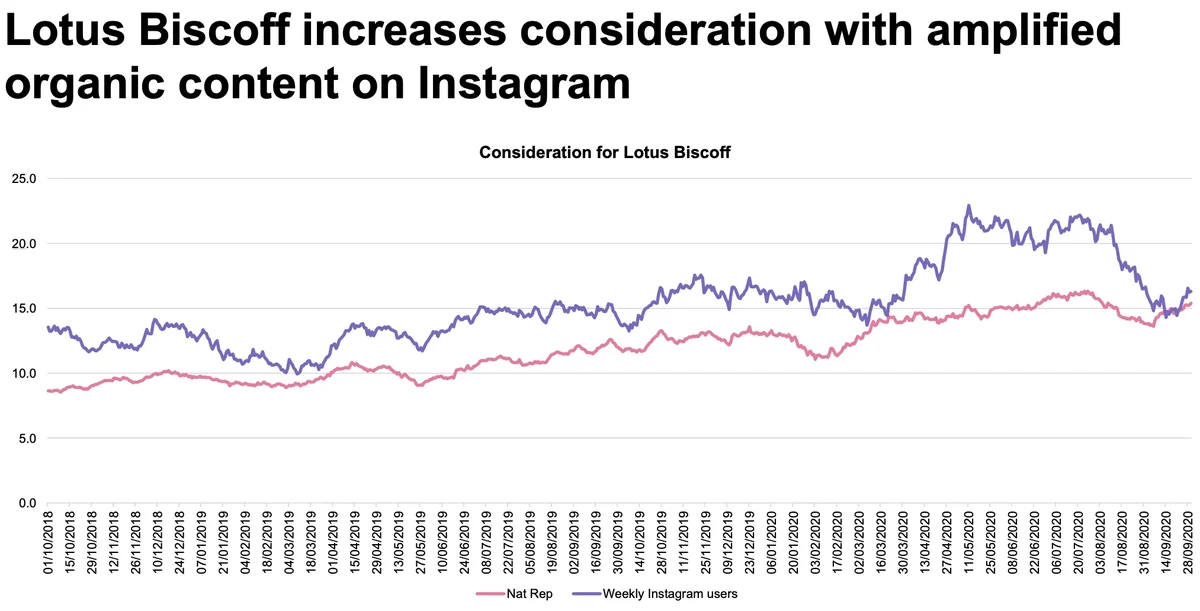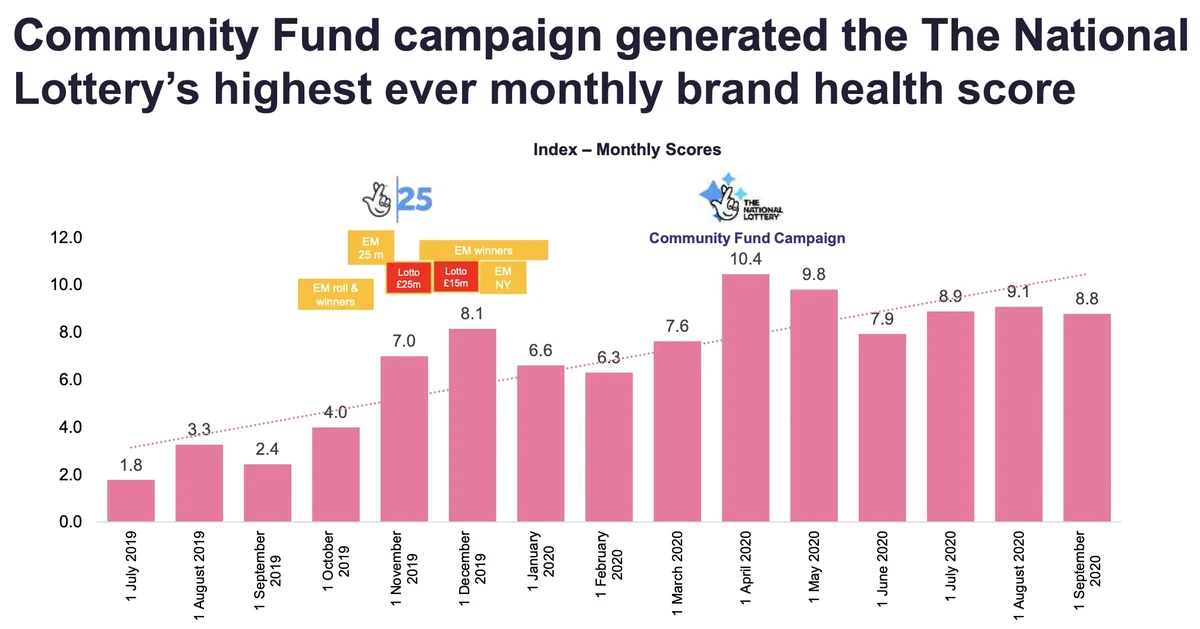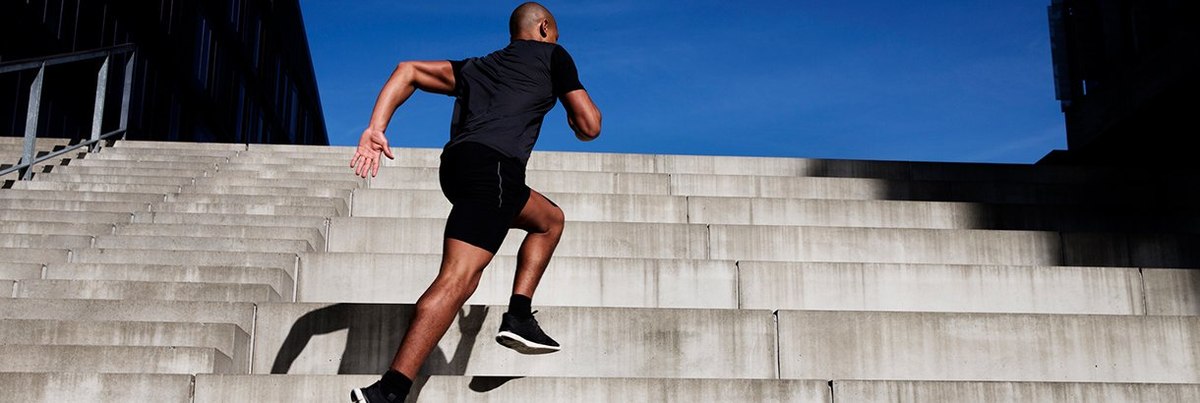As this last year makes as clear as any, the brands that truly understand themselves will continue to resonate with customers even amid disruptions in the world. For a few select brands in the UK, the headwinds thrown their way proved to be opportunities to grow and their positive actions throughout 2020 led to significant improvements in brand health.
In a recent webinar, “The UK’s Best Brand Improvers: How did they do it”, YouGov examines the ten companies that improved their brand health the most over the year, as measured by our Index metric. Index scores are one of sixteen metrics our BrandIndex tool tracks brands against daily around the world.
Index scores are derived using six consumer perceptions that prove critical to the success of a brand: it considers consumers’ overall impression of a brand and its reputation; whether consumers would recommend the brand; whether the brand represents good value and quality; and how satisfied consumers are with a brand’s goods and services.
Hosted by Amelia Brophy – Head of Account Management at YouGov – and joined by Keith Moor, CMO of Camelot Group which operates the UK’s National Lottery, the fireside chat explores why our experts think each of these brands was able to grow and show success among British consumers.
Massively popular streaming services and tech brands show there’s always room for growth
Starting with an already impressive brand health score of 35.1, Netflix managed to build on its success and generated an increase of 7.1 points in 2020, making it last year’s most improved brand. Netflix’ growth is likely due in part to the increasing time that Brits spent at home amid pandemic restrictions but as Keith Moor explains, the brand has also been carefully investing in and curating content that both captures people’s attention and comes up often in conversations. YouGov data shows that roughly a third of Brits were talking about Netflix throughout 2020 and during the same period, the brand increased its share of current customers.
Amazon Prime Video is another digital streaming service that improved in the eyes of British consumers for slightly different reasons. The subscription streaming service not only saw a boost in Consideration among adults overall but also specifically among sports fans in the UK – a sign that Amazon’s investment into live sports like exclusive access to Premier League matches for Prime members paid off.
WhatsApp also saw a notable 8.3% increase in its share of current customers throughout 2020 and as Amelia Brophy observes, transformed from “the tool of early adopters to the one that everybody is now using to communicate”. YouGov data from the past two years reveals the tech brand has steadily been winning over populations of the UK that had not used the messaging service before, with significant improvements in the number of men and grandparents that now use the platform.
FMCG brands invested in their communities and advertising strategies in order to connect with consumers
Two popular heritage brands typically found on grocery shelves made the most of the nation’s heightened intent to snack and this, along with other positive actions from Cadbury and Coca-Cola, landed them on the list of biggest improvers. With many Brits confined to spaces no larger than their own homes and unable to visit their favourite places to eat and drink, many turned to snacks instead for enjoyment and convenience.
Cadbury’s and Coca-Cola’s Index scores improved by six points and five points, respectively, in 2020 with major improvements in each brand’s Value, Reputation, Recommend and Impression scores. These improvements may reflect both brands’ efforts to give back and support key workers and those in need during last year’s challenging times. Cadbury, as an example, supported both charities and local communities by donating supplies and products across the country. At one point during the height of the pandemic, the confectionary brand repurposed its 3D printing technology to help print medical visors for key workers.
And despite being a lesser-known FMCG brand, Lotus Biscoff also made its way into the top ten improvers list this year by adapting – rather than halting – its advertising strategy. YouGov data shows consideration for the Belgian-based biscuit company steadily rose throughout last year but that wasn’t the best the brand could do. Lotus Bakeries increased its consideration even further among social media users and younger British adults in the summer of 2020 through a stream of organic Instagram content showcasing what normal people made for breakfast amid the lockdown. This offered a space and community for people to connect and share ideas for recipes using the brand’s products.
“In the case of these [confectionary] brands, I think the key is that they‘ve chosen to invest,” observes Moor. ”They’ve chosen to invest during this period and be present for people,” he says, arguing that the data reflects how the positive actions of these brands in turn positively affected their scores across a range of metrics for the better.

A low-cost airline showed gains by staying true to its core proposition – value
Europe is still reeling from COVID-19's impact on the travel sector but Ryanair, the region ’s ultra-low fare airline, continued to operate amid the pandemic and even played a role in repatriating Irish travellers back to their home countries amid the pandemic.
Ryanair’s brand image has long often been tied to low levels of customer satisfaction and that didn‘t change much last year but by keeping costs low and continuing to offer short-haul flights, the airline managed to grow in Value, Reputation and Impression in the eye of British consumers over the last year. Ryanair’s negative Buzz has long outweighed the number of positive conversations people tend to have about the airline, but there have been some improvements for the brand despite the pandemic year. The airline has slowly but steadily decreased its overall negative Buzz in the last year and even sees a slight uptick in positive Buzz over the same period.
“Value is core to [Ryanair’s] proposition and what [the brand] stands for,” says Moor. “The brand has made a very conscious effort to ask people to trade other aspects for value – and lots of people do it, including myself. Another important factor is that [Ryanair’s] been there this year when others have chosen not to be...and that’s resonating with people and that’s helped [Ryanair].”
Providing entertainment and assistance to those in need
Coming just behind Netflix in our Improvers list, The National Lottery was the second highest performer with a change in score of +7.0. The brand celebrated its 25th birthday anniversary in November 2019 and decided to invest in communities by setting up a special pot of funding that supports activity designed to bring people and charities together all over the UK. The National Lottery then did something similar with the Community Fund at the onset of the COVID-19 pandemic; £600m raised by players of the National Lottery so far will be distributed to good causes related specifically to the pandemic.
“We maintained a message that’s relevant and one that we can count on,” explains Keith Moor. “There was also [advertising] investment at an appropriate level and that in turn provided great value in media. We should recognise that brands have a role to play in their appropriate space. For the National Lottery, it’s about entertainment and people quickly discovered amid grim times that we still like to be entertained – that’s why people watched TV more. We didn’t want to drive people into stores [to buy lottery tickets] so we evolved by pivoting online.“
A closer look at YouGov data shows that not only did the National Lottery achieve its highest ever brand health score in 2020, but that the brand also managed to improve in its media and purchase metrics such as Buzz (+3.6 points), Ad Awareness (+1.9), and Purchase Consideration (+4.2). This is an indication that its campaigns were able to cut through the noise and linger in the minds of British consumers during each major marketing push for the National Lottery.

Amelia Brophy notes that the brand’s success hasn’t stopped there either. “The National Lottery reached its highest ever Index score in 2020 and it just really highlights the impact of the strategy. Obviously a community fund is something worth talking about, but to see that those conversations are continued because of people playing means that the good news is still spreading and that’s a really positive story.”
Watch the entire webinar on the UK’s Best Brand Improvers 2020 here
Methodology: The brands in YouGov Annual Rankings were ranked based on the Index score, which is a measure of overall brand health calculated by taking the average of Impression, Quality, Value, Satisfaction, Recommend and Reputation.
The Index Improvers chart ranks the brands with the highest increase in Index, comparing scores from the previous 12-month period. Both scores are representative of the general population of adults 18+.
All Index scores listed have been rounded to a single decimal place; however, we have used additional precision to assign ranks.
All brands have been tracked for at least 6 months to be included in the rankings and have been tracked for at least 6 months in the prior year’s period (as well as being currently tracked) to appear in the Improvers tables.

















